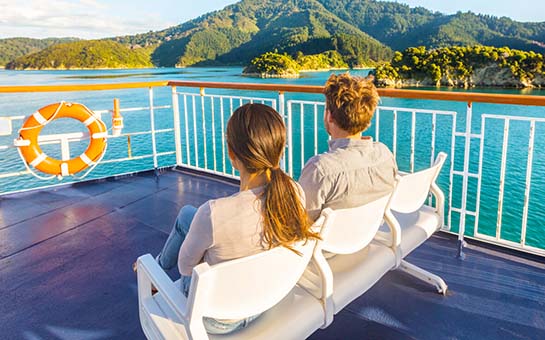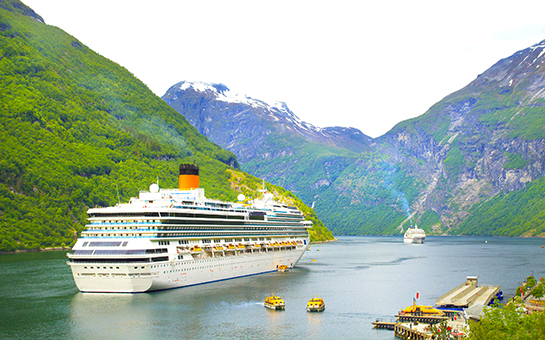Updated 2/11/25 with more tips!
Warm ocean breezes, tropical island stopovers, and endless activities make cruises an especially popular vacation choice during the winter months. However, with the rising popularity of expedition cruises and themed cruises, getting onboard with a cruise vacation can be a great idea any time of the year.
But while it’s easy to get caught up in the excitement and carefree ambiance of the cruise ship atmosphere, you still have to keep safety in mind. Cruises are one of the safest ways to travel, thanks to strict regulations, advanced security measures, and well-trained staff. Modern cruise ships are equipped with state-of-the-art safety systems, including onboard medical facilities, emergency protocols, and 24/7 security personnel. However, just like any form of travel, passengers should take precautions to ensure a smooth and secure experience at sea.
Whether you're a first-time cruiser or a seasoned traveler, understanding cruise safety best practices can help you avoid common risks. Simple steps like using the buddy system, securing your cabin, and staying aware of your surroundings in ports can significantly enhance your safety. By following essential safety guidelines, you can confidently enjoy your cruise, knowing you’re prepared for any situation.
1. Moderate Your Drinking
While a cruise can be the perfect place to let your hair down and imbibe, try to do so responsibly. Alcohol impairment can increase your risk of injuries, and overdoing it can flat-out ruin good portions of your vacation. After all, if you’re already vulnerable to seasickness, the last thing you want is to add a hangover to the mix. So, instead of taking full advantage of that open bar, try to alternate your alcoholic drinks with water. Your body will thank you.
2. Pay Attention During Safety Drills
Yes, you probably ignore the cabin crew’s safety briefings on airlines, but cruise ships are a different beast. They’re absolutely massive, so it’s essential that you know where to go in case of emergency. The ship’s safety drill will equip you with important knowledge like lifeboat locations, evacuation procedures, etc. When you’re on a ship that’s the size of a small city, this is information that you simply must have.
3. Explore Port Cities Carefully
While you might have the urge to explore on your own when your cruise stops in port cities, do so responsibly. Not every area of each port is safe for tourists. And if you get hopelessly lost, you could risk missing the ship’s departure. It’s best to stick to cruise-arranged tours when possible. If you decide to set off on your own, make sure you’re armed with a good amount of local knowledge first.
4. Don’t Carry More Cash Than You Need
If you lose a credit card, it can be cancelled and replaced. But if you lose a large amount of cash, it’s usually gone for good. Luckily, most every transaction aboard a cruise ship can be completed with a credit card or billed to you. If you want to carry cash while visiting a port city to buy souvenirs, don’t go overboard. Just carry the money that you need for the day. Leave additional funds securely locked in your cabin. Also, it’s a good idea to carry your bills in a money belt while ashore. Tourist areas are notorious for pickpockets, so you’ll want to depend on more than just luck to keep your cash secure.
5. Use the Buddy System
One of the best ways to enhance cruise safety is by using the buddy system while on board and at ports of call. Traveling with a companion reduces the risk of getting lost, encountering scams, or becoming an easy target for theft. Cruise ships are designed to be safe, but unexpected situations can arise—having someone by your side ensures an extra layer of protection. When exploring new destinations, avoid venturing into unfamiliar areas alone, especially at night. If you're traveling solo, consider joining a group for excursions or activities. In busy public areas, stay aware of your surroundings and agree on a meeting spot in case you get separated. By sticking together, you can confidently enjoy your cruise while prioritizing safety at sea.
6. Practice In-Cabin Safety
Prioritizing in-cabin safety is an essential part of cruise safety, ensuring peace of mind throughout your trip. Always lock your cabin door and use the security latch when inside to prevent unauthorized access. Store valuables like passports, cash, and electronics in the in-room safe rather than leaving them in plain sight. Avoid sharing your room key or cabin number with strangers and be cautious when opening the door for unexpected visitors—verify their identity through the peephole or call the front desk if unsure. If your cabin has a balcony, secure the door when not in use, especially at night. Staying vigilant with these simple precautions can help protect your belongings and personal safety, allowing you to fully enjoy your time at sea.
7. Follow the Ship’s Safety Rules
Cruise lines implement strict safety regulations to ensure the well-being of all passengers and crew, making it essential to follow the ship’s safety rules. Upon boarding, attend the mandatory muster drill to familiarize yourself with emergency procedures, evacuation routes, and life jacket locations. Pay attention to all safety briefings and follow crew instructions in case of an emergency. Obey restricted area signs, avoid climbing on railings, and never enter crew-only sections. Fire safety is also a priority—avoid using open flames in your cabin and properly dispose of cigarette butts in designated areas. When on deck, be cautious of wet surfaces to prevent slips and falls. By following these rules, you contribute to a secure environment for yourself and fellow passengers, ensuring a smooth and worry-free cruise experience.
8. Choose the Right Insurance
Many cruise lines may sell something that they call “travel insurance,” but it typically offers far too little coverage to be useful when you need it. You’re far better off buying travel insurance from a company that actually specializes in insurance.
If you have no need for travel-related benefits and are solely interested in medical coverage in case you get sick or injured while on your cruise, consider travel medical insurance, which can often be had for a considerably cheaper price.

